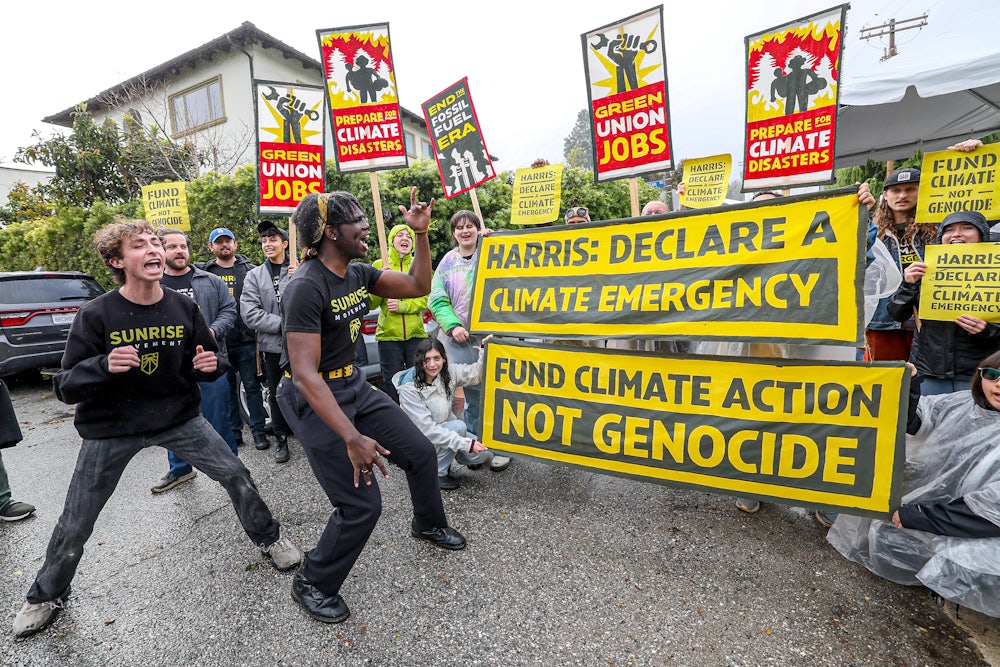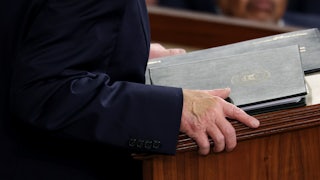Axios dropped a “SCOOP” late Tuesday: The Sunrise Movement is withholding its endorsement of Joe Biden. The report noted that the youth climate group is taking a “wait-and-see” approach, as gleaned from a call with volunteer leaders in April debating the merits of an endorsement. “Sunrise is still finalizing plans for the 2024 general election,” Sunrise communications director Stevie O’Hanlon told Axios. “Like in 2020, we are not planning to endorse Joe Biden.” The article went on to elaborate that Sunrise, despite not endorsing Biden in 2020, “helped mobilize its volunteers to contact other young voters to vote against Trump.”
Online, pundits chided Sunrise as “deeply unserious” and inadequately grateful for the Inflation Reduction Act that Democrats passed nearly two years ago. Lincoln Project co-founder Rick Wilson even accused the group of backing Donald Trump. Left out of Axios’s story was the fact that Sunrise will once again be working to mobilize young voters against Trump in November. “Do we want to be fighting for a Green New Deal under a Trump presidency or a Biden presidency? To me, the answer is pretty clear,” O’Hanlon told me earlier today. “Donald Trump winning a second term is an existential threat to our climate and our democracy and will set back the fight for a Green New Deal.”
Like many member-based progressive organizations, Sunrise has internal processes for endorsing candidates at all levels of government. The group held a membership vote during the 2020 Democratic primary season, in which it decided to endorse Bernie Sanders. It opted not to hold one for the general election that year, even after then–executive director Varshini Prakasah joined a unity task force with other Sanders surrogates to shape Biden’s climate agenda. Sunrise reported that its youth voter mobilization that year resulted in 1.3 million phone calls, 2.4 million texts, and 778,000 postcards to prospective voters in key swing states and battleground districts. Sunrise also went on to play a major role in shaping the Inflation Reduction Act, and has repeatedly—and recently—praised the White House’s climate efforts while also being critical of its support for fossil fuel projects like the Willow Project in Alaska.
So let’s consider the alternative that Sunrise’s critics are implicitly arguing for: that the group’s top leaders express their gratitude for Biden’s climate record by unilaterally deciding to endorse him in the lead-up to the Democratic National Convention, sidestepping precedent from 2020 and its own endorsement procedure. Some supermajority of the organization’s staff and volunteers—harshly critical of Biden’s support for the war in Gaza and continued support for fossil fuel expansion, among other positions—would probably revolt, leaving many fewer people around to engage in anti-Trump voter outreach. As O’Hanlon noted, the amount of enthusiasm that Sunrise volunteers have to engage in those efforts will be determined in large part by what Biden does over the next several months.
This all raises the question of what purpose organizational endorsements serve. In most cases, they allow candidates to slap a group’s logo on their campaign literature. Top leaders might come out to speak at campaign events or say nice things about the candidate on social media, fostering a general attitude of goodwill among an organization’s supporters. Groups with membership bases that are routinely asked to mobilize—think unions or the Democratic Socialists of America—might pour real resources into text- and phone-banking or door-knocking operations to turn people out to the polls. In Sunrise’s case, that’s what they’ve been doing this primary season to support Squad members who’ve supported their legislative priorities and are now facing AIPAC-backed challengers, including Summer Lee and Jamaal Bowman.
Sunrise is, to reiterate, already planning voter mobilization efforts aimed at defeating Trump. Opting to endorse Biden—especially now—wouldn’t benefit Sunrise, and would carry relatively few upsides for the candidate himself. The campaign’s very early endorsements from “the nation’s major climate groups,” after all—which it trumpeted in response to Axios’s questions—haven’t done much to buoy its support among progressives.
The odd thing about some liberal pundits’ ire toward Sunrise in particular is that it seems to be rooted in two contradictory arguments: that Sunrise is an astroturfed, perpetually irrelevant shell of an organization that also also holds outsize power to deliver the presidency to Trump if it doesn’t endorse Biden as quickly as possible. Both of these things cannot be true at the same time. It’s easier, though, to yell at the left than it is to grapple earnestly with the fact that Biden is continuing to lend considerable material support to an unpopular and arguably genocidal war and is struggling in the polls for a host of reasons; in the awful event he loses in November, it certainly won’t be because the left was inadequately enthusiastic about him.
Strange too is several commenters’ bewilderment that a climate group and its members would harbor concerns about the war in Gaza or anything other than capital-C climate policies. “If your goal is action on climate, Biden is the only option,” Tré Easton, Senator John Fetterman’s legislative director, wrote on X. “Pretending otherwise is delusional.” But Biden’s foreign policy is hardly unrelated to the climate crisis. Like his increasingly draconian border policies, it has a major influence on how the United States will continue to shape a warming world. The U.S. military is a major contributor to the climate crisis in its own right, and the government’s continued support for Israel’s brutal war threatens to undermine the kinds of international collaboration needed to rapidly reduce emissions worldwide.
As people motivated largely by an objection to human suffering, O’Hanlon elaborated, Sunrise’s members and staffers are also predisposed to finding the Israeli government’s U.S.-backed atrocities in Gaza intolerable. “Young people come to Sunrise because they are deeply frustrated at seeing people lose their homes, having their water poisoned, and losing their loved ones to climate disasters,” she said. “The causes are different in Gaza, but millions of people are being displaced and facing inhumane conditions. For young people who want everyone to have clean air, clean water and safe homes, it’s disgusting to see what the U.S. government is funding.”






